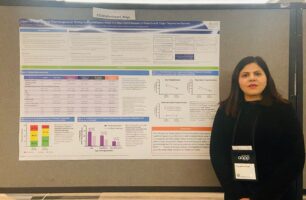*This blog summarizes key points discussed during the Nov. 19, 2020 GeneSight Webinar
Four renowned panelists identified several barriers preventing people from receiving needed mental healthcare and identified strategies to remove these barriers.
 |
Lesa Caffee is a nurse practitioner with Senior Wellness Group in Royal Oak, Mich. She sees a largely senior population in a mostly rural area. |
 |
Dr. Travis Mickelson is a psychiatrist and medical director of Mental Health Integration at Intermountain Healthcare in Salt Lake City, Utah. Dr. Mickelson is at the forefront of helping primary care physicians be better mental healthcare providers. |
 |
Rev. Edwin Lloyd is the pastor of the Allen Chapel AME Church in Asbury Park, N.J. He brings his belief in mental healthcare to his ministry and encourages members of his congregation to get help for their depression and anxiety. |
 |
Dr. Balin A. Durr is a child, adolescent, and adult psychiatrist at the Will County Community Health Center in Joliet, Ill. The Center is a Federally Qualified Health Center (FQHC), which receives federal funding and provides care to all. It delivers services in areas of clinical shortage – like mental health. Dr. Durr is the author of Heaven Abounds in You and has a podcast about addiction, depression and suicide called Today’s Mental Health Trilogy. |
External Barriers Preventing Quality Mental Healthcare
There are multiple areas where patients may face hurdles when attempting to access quality mental health services.
Accessibility
In rural areas, patients may only find one or just a few doctors offering mental health services, which may mean they would have a hard time scheduling an appointment with an available provider. This leads to additional problems if a patient is unable to form a bond with that healthcare provider – they may not be able to find another doctor nearby.
Touching on inequalities in mental healthcare in both rural and non-rural areas, Dr. Durr described that patients may face transportation hurdles, language barriers, and limitations on how often they can take off work. Rev. Lloyd agreed that transportation is especially difficult in African American communities with less access to public transportation. These barriers can contribute to higher rates of non-adherence to medication plans and lower appointment attendance.

Rural community health centers have limited funding compared to other areas, according to Dr. Durr. Physicians often take on the additional role of providing mental health services for more severe cases due to the chronic shortage of psychologists and psychiatrists.
While telehealth has been a promising development in reaching new patients, it can still be challenging due to internet connection or other technology issues. For senior patients, the technology itself may pose a challenge. Further, telehealth may be more difficult for people in abusive relationships because they lack options for support and privacy due the pandemic.
Acceptability
“There is still the stigma of mental health,” said Caffee. Many patients may be concerned about confidentiality and appearances if they are seen going to an appointment or if word spreads to others that they sought help for their mental health.
Rev. Lloyd touched on how mental health stigma in minority communities affected him personally. In order to become an ordained elder in his church, Rev. Lloyd had to take a psychological assessment. Due to his concerns about the stigma associated with mental health, he went to a facility outside his community to take the evaluation.
Affordability
Caffee noted that there are differing costs for patients who are trying to use mental healthcare. She noted that seeing a specialist may be more expensive than seeing a patient’s primary care doctor, or a patient may not have mental health services covered by their insurance plan. Additionally, some patients may not be able to afford the extra cost that may be associated with seeing a specialist.
Inequities in Mental Healthcare
In her nine years of experience with telepsychiatry, Dr. Durr shared that some of the most persistent barriers in populated counties are due to poverty, homelessness, addiction, and/or limited access to technology.
At the community health center where she practices, she sees a high level of severe and chronically ill mental health patients. Despite the severity of the cases she sees, psychiatry is not a procedure-based specialty and, as a result, the field receives lower reimbursement compared to other specialties. Community health centers tend to be underfunded, which makes them less competitive to recruit top staff. Each of these factors may contribute to overall lower care.
Additionally, Rev. Lloyd explained historical barriers have fostered a sense of distrust in medical institutions.
“When you look at how people have been psychologically, physically, emotionally, spiritually and financially dehumanized, it makes for a lot of discomfort and a lack of trust in dealing in institutions or dealing with anyone that doesn’t look like an African American,” said Rev. Lloyd.
Dr. Durr agreed that disconnects between a clinician and patient introduce the potential for misdiagnosis due to misinterpretation. Patients sometimes don’t know their illness well enough to report their symptoms accurately, or if they disagree with their doctor’s diagnosis, they may not adhere to their clinician’s recommendations.
The Role of Spirituality in Mental Wellbeing
“Where there is no guidance, a nation falls, but in an abundance of counselors there is safety.”
– Proverbs 11:14
Rev. Lloyd shared this passage to demonstrate the importance of collaboration among counselors in the care of mentally ill patients.
“We must work together – faith leaders and clinicians,” said Rev. Lloyd. “I have to allow that person to share their story… It’s important that we’re compassionate, it’s important that we show empathy and sympathy in some instances.”
One reason that collaboration is needed is because the church at times may create barriers if the first (or only step) taken is prayer.
“That’s missing the boat. Because if I’m hungry and I come to you and [all you do is] pray for me, you’re not feeding me,” he said. “Well, you haven’t solved my problem.”
How Primary Care Providers Become Better Mental Healthcare Providers
According to Dr. Mickelson, integrating mental health into primary care practices may benefit both the patient and the mental health system. Investing in integration programs and transitioning from a traditional fee-for-service mode to a value-based (or outcomes-based) model may result in cost savings and better care for patients.
Caffee urged healthcare providers in rural areas to recognize that incorporating mental health into their practice is more important because they might be the only clinician available to a patient.
Clinicians should work to improve cultural competency and seek better understanding of the experiences of diverse patients. Rev. Lloyd emphasized that spiritual leaders and clinicians should listen with intent and be collaborative with one another in sharing what they’ve learned.
One of the most positive changes made to both the adult and pediatric hospitals at Dr. Mickelson’s health system was adding a “Talk to a Chaplain” program.
“I can’t underscore how powerful that has been to make that connection with the chaplains at our hospital,” said Dr. Mickelson.
To help patients who find it difficult to attend in-person appointments or prefer virtual care, some companies are introducing ways to conduct testing historically administered in an office setting. For example, clinicians registered with GeneSight can use GeneSight® at Home to send patients an easy-to-follow sample collection kit.
Watch the entire webinar on GeneSight’s YouTube page to learn more about the barriers your patients may need to overcome before reaching your office, and watch Dr. Durr describe a mind-body exercise you can immediately begin using in your practice.
Our articles are for informational purposes only and are reviewed by our Medical Information team, which includes PharmDs, MDs, and PhDs. Do not make any changes to your current medications or dosing without consulting your healthcare provider.
The GeneSight test must be ordered by and used only in consultation with a healthcare provider who can prescribe medications. As with all genetic tests, the GeneSight test results have limitations and do not constitute medical advice. The test results are designed to be just one part of a larger, complete patient assessment, which would include proper diagnosis and consideration of your medical history, other medications you may be taking, your family history, and other factors.
If you are a healthcare provider and interested in learning more about the GeneSight test, please contact us at 855.891.9415. If you are a patient, please talk with your doctor to see if the GeneSight test may be helpful.






